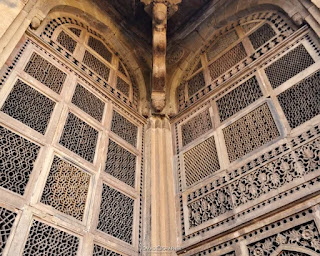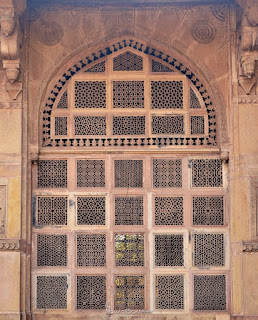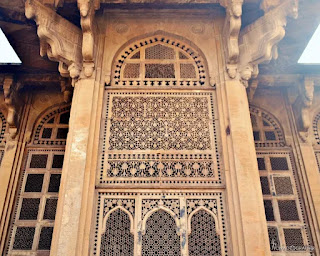 |
| Tomb of Md. Ghaus, Sufi saint, Gwalior. fabhotels.com |
 |
| Tomb of Md. Ghaus, Sufi saint, Gwalior. nomadographer.com |
 |
| Tomb of Md. Ghaus, Sufi saint, Gwalior. nomadographer.com |
Among many monuments in Gwalior city, Madhya Pradesh, that saw the rise and fall of many kings, queens and sultans there are some gems that lie hidden and awareness about them in the public is very much limited for reasons of lack of publicity. Gwalior was also home to many sages, saints and Sufi saints who were held in great esteem in this part. One of the hidden gems is not the tomb of a ruler, but that of a famous Sufi saint Muhammad Ghaus.
 |
| Location map of Gwalior, MP.. mapsofindia.com |
Muhammad Ghaus was a Sufi saint, a musician and the author of Jawahir-i Khams (Arabic: al-Jawahir al-Khams, The Five Jewels), he wrote it when he was just 25 years old. He lived in the 16th century (1500–1562). Born and brought up here he was quite popular during the Mogul rule. After Humayun was defeated by Sher Shah Suri, to avoid bein caught by the Afghan forces, Md. Ghaus in the 1540s fled to Ahmedabad, Gujarat for ten years during that period he founded Ek Toda Mosque He returned to his native place after the Mogul came back to power.
Quite surprising is the fact, being well-versed in Sanskrit, Ghaus translated the Amrtakunda from Sanskrit to Persian as the Bahr al-Hayat (The Ocean of Life), first incorporating a set of yoga practices Sufism. Being quite popular, Ghaus had many disciples including Mughal Emperor Humayun, Akbar's court musician Tansen Badusha and others. He had close contact with Babur, Akbar and Humayun.
At the popular Nagore Dhargah (Nagapatnam district, Tamil Nadu) the tomb was built over Sufi saint Abdul Qadir Shahul Hamid Meeran sahib (1490–1579 CE) one of the important disciples of Sufi saint Ghaus of Gwalior. Saint Shahul Hamid was a well known Sufi saint in the coastal area of Tanjore and once he saved the life of the 16th century Hindu ruler Achuthappa Naik and in the later period the durgah received many favors from the Maratha rulers of Tanjore (Thanjavur), including 4000 acres of agricultural lands.
As saint Ghaus helped Babur capture the Gwalior fort he got a huge land as a gift from the ruler where he had built a center to spread Sufi music and sufi philosophy. One of his disciples in music was Ramtanu Misra
 |
| Tomb of Md. Ghaus, Gwalior. sid-thewanderer.com/ |
Above image: Jali work in the verandah, Md. Ghaus Tomb, Gwalior, MP.
 |
| Tomb of Md. Ghaus, Sufi saint, Gwalior. nomadographer.com |
 |
| Tomb of Md. Ghaus, Sufi saint, Gwalior. nomadographer.com |
Above images: Md. Ghaus Tomb, Gwalior, MP. perforated stone screens - Jali. One can see innovative and intricate designs and geometric patterns all around the building.....
Mohamed Ghaus died in Gwalior in 1562 and left behind lots of disciples His tomb in Gwalior was built by Akbar during his reign. A fine example of Mogul architecture, blending Indo Muslim features/Square in plan the main building has a huge dome, the original glazed tiles are no longer there due to passage of time. Besides chhatri at each of the four corners, there is a slightly larger chhatri in the middle on all sides. They are all symmetrically well-place. One can see perforated screens (jali) of amazing patterns all around the building to keep the building cool and gently illuminated during the day
Built by Akbar in honor of the sain,t it is is a well-known tourist spot here. Tansen was buried in Ghaus' tomb complex.
https://nomadographer.com/2019/01/16/muhammad-ghaus-gwalior-nomadographer/
https://www.fabhotels.com/blog/places-to-visit-in-gwalior/
https://www.sid-thewanderer.com/2018/06/tombs-tansen-gwalior.html
https://en.wikipedia.org/wiki/Muhammad_Ghawth









